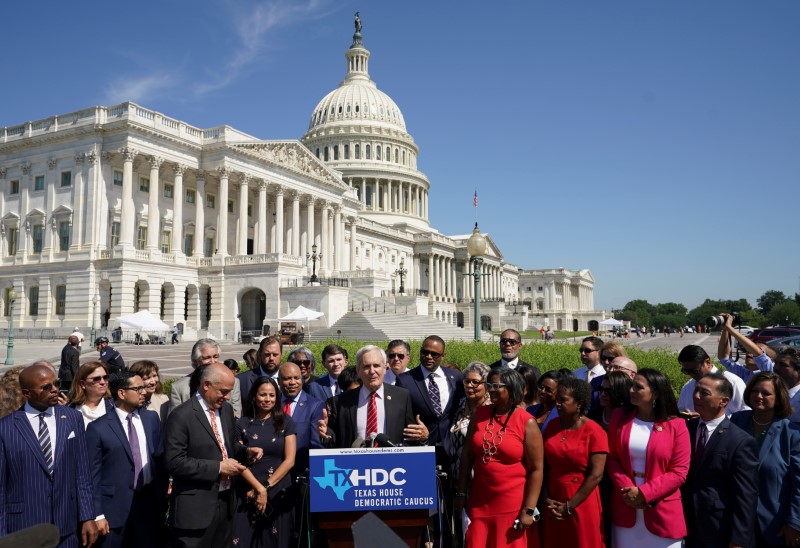
By Susan Cornwell and Julia Harte
WASHINGTON (Reuters) -Texas Democratic lawmakers who fled their state to thwart Republican efforts to pass new voting restrictions defied calls for their arrest on Tuesday and said they would stay in Washington to push for federal voting reform.
More than 50 Democratic lawmakers left Texas on Monday, denying the state legislature the quorum required to approve the measures on Republican Governor Greg Abbott’s special session agenda.
The remaining members of the Texas House of Representatives voted 76-4 on Tuesday morning to send for the missing lawmakers under a House rule that authorizes the chamber’s sergeant-at-arms to find and arrest absentee members.
“As soon as they come back in the state of Texas, they will be arrested,” Abbott said in an interview with local TV station KVUE ABC. “They will be cabined inside the Texas Capitol until they get their job done.”
Abbott, who slammed the Democratic lawmakers for leaving the state, vowed to continue calling for special sessions “all the way up until election next year” to get the voting bill passed.
Texas is one of a number of Republican-led states pursuing new voting restrictions in the name of enhancing election security following former President Donald Trump’s claims that the presidential election last November was stolen from him through widespread fraud.
On Sunday, Texas House and Senate committees passed new versions of the voting measures, which would prohibit drive-through and 24-hour voting locations, add new identification requirements to mail-in voting and empower partisan poll watchers.
The full Texas Senate is expected to vote on its version of the voting legislation on Tuesday.
The Democratic lawmakers’ exodus from the House brought work there to a halt, with the departed Democrats vowing to stay in Washington indefinitely.
“Our intent is to stay out and kill this bill this session,” Texas House Democratic Caucus Chairman Chris Turner told a news conference outside the U.S. Capitol, where dozens of Texas Democratic lawmakers broke into the civil rights anthem, “We Shall Overcome.”
Special legislative sessions can last up to 30 days in Texas, meaning the current session must end by Aug. 7. There is no limit to how many special sessions a governor can call.
Texas state Representative Alex Dominguez said he was prepared to stay away from Texas even if Abbott continues to call special sessions after the current one ends. Dominguez said he was not deterred by the threat of arrest.
“If that’s what they choose to do, then we’ll be ready,” Dominguez said.
Democratic lawmakers staged a similar walkout on May 30 to boycott a vote on an earlier version of the voting legislation just before the legislature’s regular session ended, prompting Abbott to call the special session.
Turner said the state lawmakers would use their time at the Capitol in Washington “to implore the folks in this building behind us to pass federal voting rights legislation.”
DEMOCRATS PRAISE LAWMAKERS
President Joe Biden in a speech on Tuesday is expected to issue a strong appeal for congressional passage of sweeping Democratic-backed voting rights legislation that has stalled amid Republican opposition.
Republican resistance in the Senate to such reforms has increased pressure on Senate Democrats, who narrowly control the chamber, to pursue a filibuster carve-out that would let them pass sweeping voting rights legislation with a simple majority.
U.S. Senate Majority Leader Chuck Schumer, a Democrat, said he would meet with a group of the Texas Democrats on Tuesday to discuss strategy.
He was among the party’s leaders, including U.S. Vice President Kamala Harris, who praised the state lawmakers for taking a stand. Harris will meet with the lawmakers later this week.
“I think they have shown great courage, and certainly great conviction and commitment,” Harris said in an interview with Reuters.
Asked in a hallway of the Capitol whether he would meet the Texas Democratic lawmakers, Republican U.S. Senator John Cornyn of Texas replied, “Not if I can help it.”
(Reporting by Julia Harte in New York; Additional reporting by Susan Cornwell and David Morgan in Washington; Editing by Colleen Jenkins, Will Dunham and Paul Simao)












